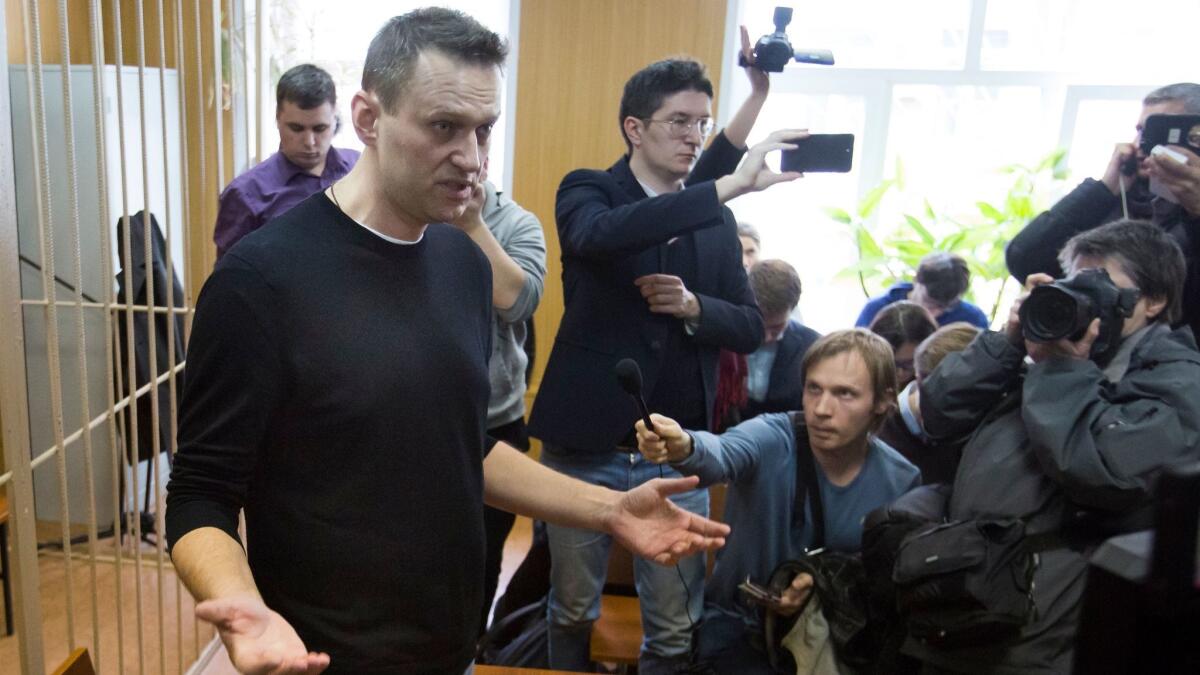Russian opposition figure Navalny gets a relatively light, 15-day sentence after protests

- Share via
Reporting from Moscow — Russian anti-corruption crusader and opposition leader Alexei Navalny was sentenced to 15 days in jail Monday, one day after rallies he organized attracted tens of thousands of people and resulted in hundreds being detained by authorities.
The Tverskoy district court also fined Navalny $350 for organizing an unsanctioned rally in Moscow on Sunday, during which he was arrested just minutes after arrival for purportedly resisting police orders.
The rallies in Moscow and dozens of Russian cities and towns were the country’s largest since the 2012 protests against President Vladimir Putin’s return to the Kremlin for a third presidency. They took many people in Russia by surprise with their scope and demographics.
Many protesters were youths, unusual in Russia, where protests are mostly attended by older people.
“I am very glad and happy to see the emergence of a generation in the country that is not ready to just abide by this attitude of the authorities,” Navalny, 40, said in court.
The Kremlin said Navalny and his supporters attracted youngsters to rally with them by promising them money. Authorities and pro-Kremlin parties routinely offer around $10 for taking part in pro-government marches.
“Underage participants of the rally in Moscow were promised monetary awards in case of their detention by law enforcement officers,” Kremlin spokesman Dmitry Peskov told journalists in a conference call.
Peskov declined to answer a question about a documentary released on YouTube by Navalny’s anti-corruption fund about Prime Minister Dmitry Medvedev’s alleged involvement in corruption schemes that purportedly made him a billionaire. The 50-minute-long documentary has been viewed more than 11 million times and was shared by hundreds of thousands of users of social networking websites.
The Kremlin and state-controlled television ignored the documentary. Some of the officials and Medvedev relatives mentioned in it denied involvement in the schemes.
Navalny is a lawyer by training whose political career is rooted in dozens of investigative reports about corruption among top Russian officials and in state-run companies.
The Kremlin usually snubs the reports and is widely seen as a power behind the accusations Navalny faced in courts.
In February, he was given a suspended sentence of five years in jail for alleged fraud. The legal process was a retrial of a 2013 fraud case that initially ended with a five-year sentence, but was overturned by Russia’s Supreme Court after massive riots in Moscow.
The suspended sentence is widely seen as a way for the Kremlin to ban Navalny from running for office — under Russian election law he cannot run because of his criminal record.
The trial Monday was also widely seen as Kremlin-orchestrated.
Junior Judge Alesya Orekhova said Navalny was accused of disobeying the orders of police officers during the Sunday rally.
Navalny pledged to defend activists who were detained or arrested by filing a complaint to the European Court of Human Rights and appealing detentions in Russian courts.
Last year, the European Court of Human Rights ruled that Russia violated Navalny’s right to a fair trial in 2013.
However, Navalny’s legal team is currently decimated. His fund was raided by police Sunday, several staffers were arrested for “resisting a rescue operation” that followed an alleged bomb threat, and the organization’s computers and paperwork were confiscated without a court order, he said.
Most of them have been arrested for up to 25 days, his lawyer Olga Mikhailova said.
The Kremlin’s response to Sunday’s rally seemed rather mild in comparison with a massive crackdown that followed the 2012 anti-Putin protests.
Hundreds of protesters were arrested, and dozens faced trial and were sentenced to jail; one of the defendants committed suicide. Opposition leaders, including Navalny, were interrogated and had their offices and apartments searched.
Pro-Kremlin media ran reports vilifying the opposition and saying they received funding from Washington. The Kremlin toughened punishment for holding unsanctioned rallies and labeled Western-funded non-government organizations “foreign agents.”
Mirovalev is a special correspondent.
More to Read
Sign up for Essential California
The most important California stories and recommendations in your inbox every morning.
You may occasionally receive promotional content from the Los Angeles Times.













